Answer is C
only reader role will get the email. other AD groups or principals will not get an email
HOTSPOT
You have an Azure virtual machine named VM1 and a Recovery Services vault named Vault1.
You create a backup policy named Policy1 as shown in the exhibit. (Click the Exhibit tab.)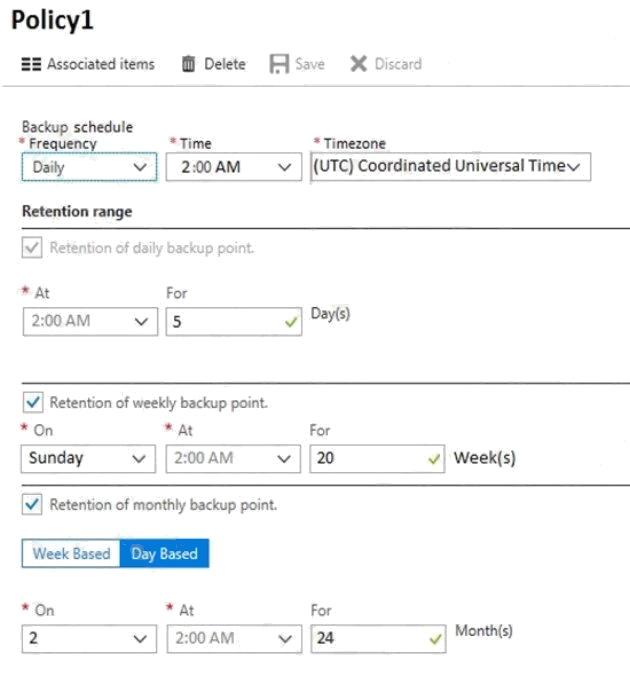
You configure the backup of VM1 to use Policy1 on Thursday, January 1.
You need to identify the number of available recovery points for VM1.
How many recovery points are available on January 8 and January 15? To answer, select the appropriate options in the
answer area.
NOTE: Each correct selection is worth one point.
Hot Area: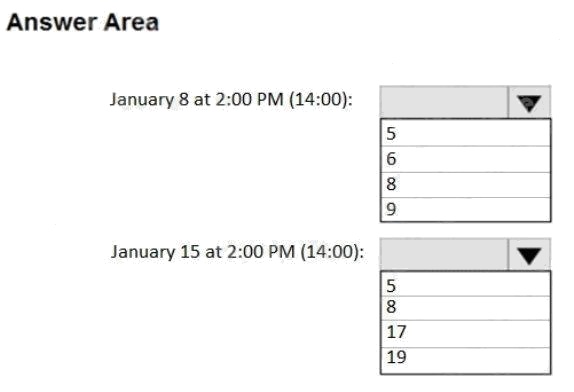
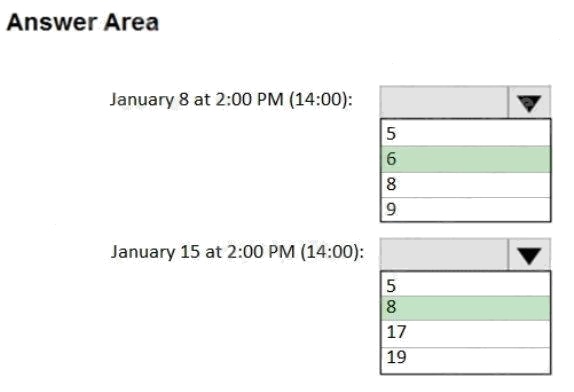
Explanation:
Box 1: 6
5 latest daily recovery points, which includes the weekly backup from the previous Sunday, plus the monthly recovery point.
Box 2: 8
5 latest daily recovery points, plus two weekly backups, plus the monthly recovery point.
Reference: https://social.technet.microsoft.com/Forums/en-US/854ab6ae-79aa-4bad-ac65-471c4d422e94/daily-monthly-
yearly-recovery-points-and-storage-used?forum=windowsazureonlinebackup
You have an Azure subscription that contains the identities shown in the following table.
User1, Principal1, and Group1 are assigned the Monitoring Reader role.
An action group named AG1 has the Email Azure Resource Manager Role notification type and is configured to email the
Monitoring Reader role.
You create an alert rule named Alert1 that uses AG1.
You need to identity who will receive an email notification when Alert1 is triggered.
Who should you identify?
C
Explanation:
Email will only be sent to Azure AD user members of the Monitoring Reader role. Email will not be sent to Azure AD groups
or service principals.
Reference: https://docs.microsoft.com/en-us/azure/azure-monitor/platform/action-groups
Answer is C
only reader role will get the email. other AD groups or principals will not get an email
HOTSPOT
You have an Azure subscription that contains an Azure Storage account named storage1 and the users shown in the
following table.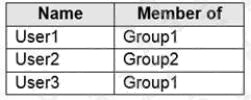
You plan to monitor storage1 and to configure email notifications for the signals shown in the following table.
You need to identify the minimum number of alert rules and action groups required for the planned monitoring.
How many alert rules and action groups should you identify? To answer, select the appropriate options in the answer area.
NOTE: Each correct selection is worth one point.
Hot Area: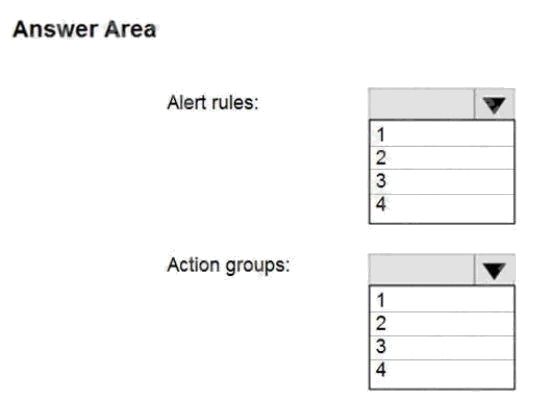
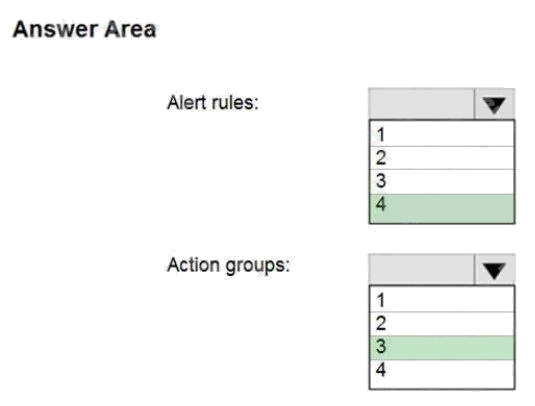
answer is correct
only one activity log signal is allowed per rule
Two Action Groups for Two alert Rules
alert rules-2
action groups-1
You have the Azure virtual machines shown in the following table:
You have a Recovery Services vault that protects VM1 and VM2.
You need to protect VM3 and VM4 by using Recovery Services.
What should you do first?
A
Explanation:
A Recovery Services vault is a storage entity in Azure that houses data. The data is typically copies of data, or configuration
information for virtual machines (VMs), workloads, servers, or workstations. You can use Recovery Services vaults to hold
backup data for various Azure services
Reference:
https://docs.microsoft.com/en-us/azure/site-recovery/azure-to-azure-tutorial-enable-replicatio
the vm and the vault have to be in the same region. since the current one is west europe and vm3 and vm4 are in noth the correct answer is A
HOTSPOT
You create a Recovery Services vault backup policy named Policy1 as shown in the following exhibit: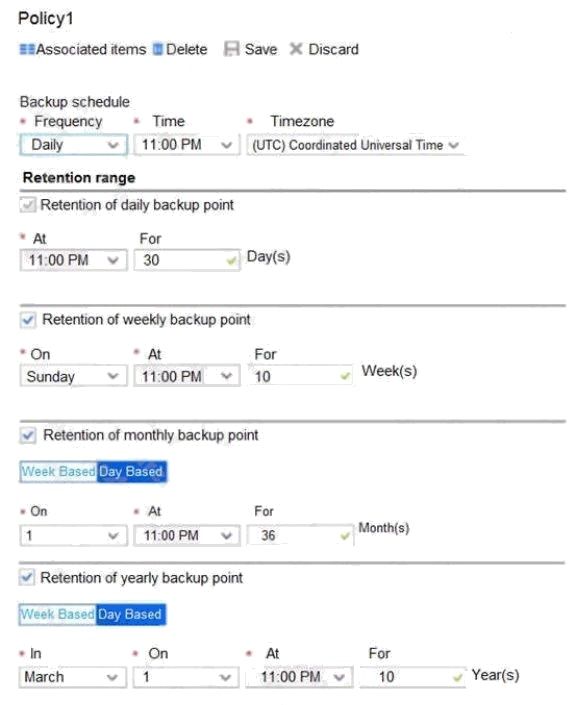
Use the drop-down menus to select the answer choice that completes each statement based on the information presented in
the graphic.
NOTE: Each correct selection is worth one point.
Hot Area: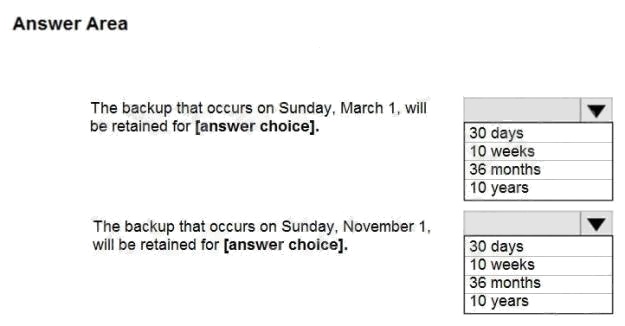
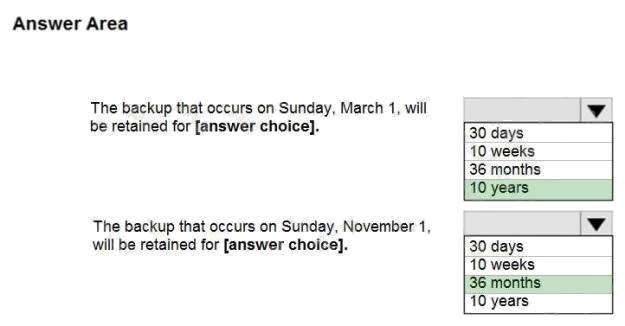
Explanation:
Box 1: 10 years
The yearly backup point occurs to 1 March and its retention period is 10 years.
Box 2: 36 months
The monthly backup point occurs on the 1st of every month and its retention period is 36 months.
Ans is correct , longer policy takes priority in case of choosing between two policies
You have an Azure subscription that has a Recovery Services vault named Vault1. The subscription contains the virtual
machines shown in the following table:
You plan to schedule backups to occur every night at 23:00.
Which virtual machines can you back up by using Azure Backup?
B
Explanation:
Azure Backup supports backup of 64-bit Windows server operating system from Windows Server 2008.
Azure Backup supports backup of 64-bit Windows 10 operating system.
Azure Backup supports backup of 64-bit Ubuntu Server operating system from Ubuntu 12.04.
Azure Backup supports backup of VM that are shutdown or offline.
Reference: https://docs.microsoft.com/en-us/azure/backup/backup-support-matrix-iaas https://docs.microsoft.com/en-
us/azure/virtual-machines/linux/endorsed-distros
correct , azure backup will support all vms and all operating systems regardless if they are powered or not
You have an Azure web app named webapp1.
Users report that they often experience HTTP 500 errors when they connect to webapp1.
You need to provide the developers of webapp1 with real-time access to the connection errors. The solution must provide all
the connection error details.
What should you do first?
A
I think A is correct , raw http data is present by the server logs
A. is Correct
Source: https://learn.microsoft.com/en-us/azure/app-service/troubleshoot-diagnostic-logs
You have an Azure subscription that contains 100 virtual machines.
You regularly create and delete virtual machines.
You need to identify unattached disks that can be deleted.
What should you do?
D
Explanation:
From Home > Cost Management + Billing > Cost Management, scroll down on the options and select View
Recommendations: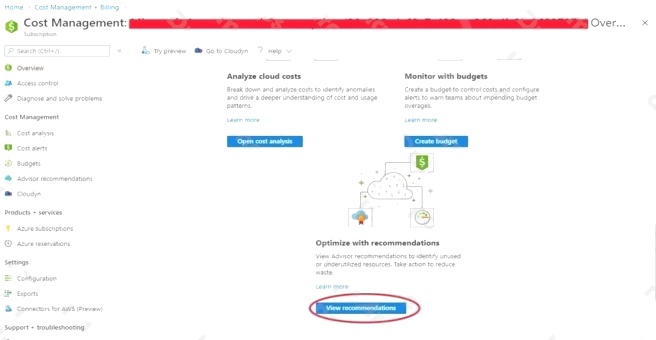
Azure Cost Management / Advisor
From here you will see the recommendations for your subscription, if you have orphaned disks, they will be listed.
Reference: https://codeserendipity.com/2020/07/08/microsoft-azure-find-unattached-disks-that-can-be-deleted-and-other-
recommendations/
D is correct Answer
You have an Azure virtual machine named VM1.
Azure collects events from VM1.
You are creating an alert rule in Azure Monitor to notify an administrator when an error is logged in the System event log of
VM1.
Which target resource should you monitor in the alert rule?
D
Explanation:
For the first step to create the new alert tule, under the Create Alert section, you are going to select your Log Analytics
workspace as the resource, since this is a log based alert signal.
Reference: https://docs.microsoft.com/en-us/windows-server/storage/storage-spaces/configure-azure-monitor
I had it on the exam day , D is correct
HOTSPOT
You purchase a new Azure subscription named Subscription1.
You create a virtual machine named VM1 in Subscription1. VM1 is not protected by Azure Backup.
You need to protect VM1 by using Azure Backup. Backups must be created at 01:00 and stored for 30 days.
What should you do? To answer, select the appropriate options in the answer area.
NOTE: Each correct selection is worth one point.
Hot Area: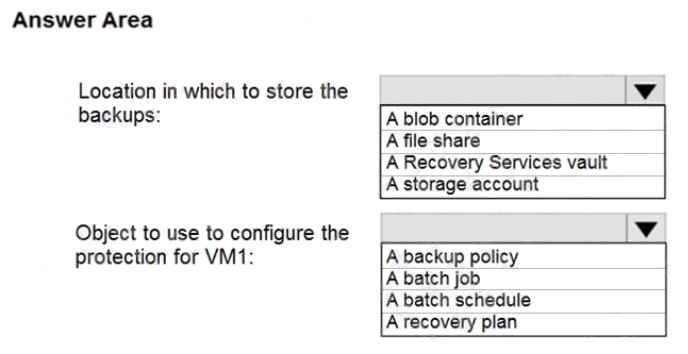
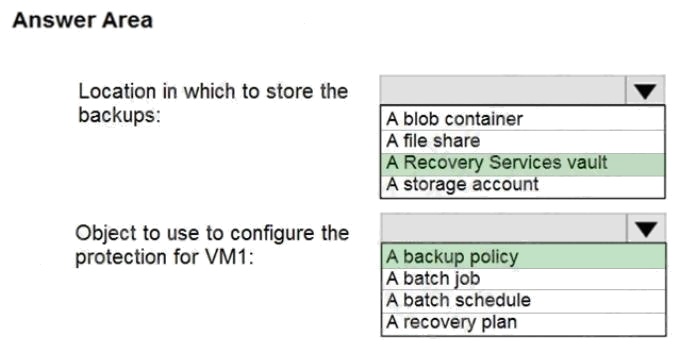
Explanation:
Box 1: A Recovery Services vault
You can set up a Recovery Services vault and configure backup for multiple Azure VMs.
Box 2: A backup policy
In Choose backup policy, do one of the following:
Leave the default policy. This backs up the VM once a day at the time specified, and retains backups in the vault for 30
days.
Select an existing backup policy if you have one.
Create a new policy, and define the policy settings.
Reference: https://docs.microsoft.com/en-us/azure/backup/backup-azure-vms-first-look-arm
correct , verified on the exam
DRAG DROP
You have an Azure Linux virtual machine that is protected by Azure Backup.
One week ago, two files were deleted from the virtual machine.
You need to restore the deleted files to an on-premises Windows Server 2016 computer as quickly as possible.
Which four actions should you perform in sequence? To answer, move the appropriate actions from the list of actions to the
answer area and arrange them in the correct order.
Select and Place: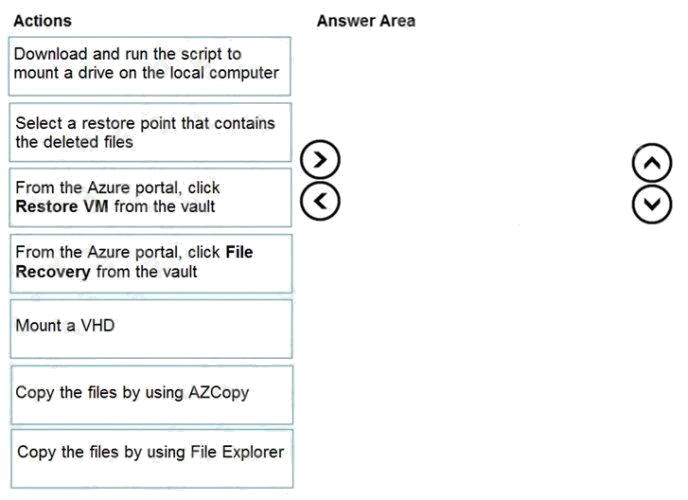
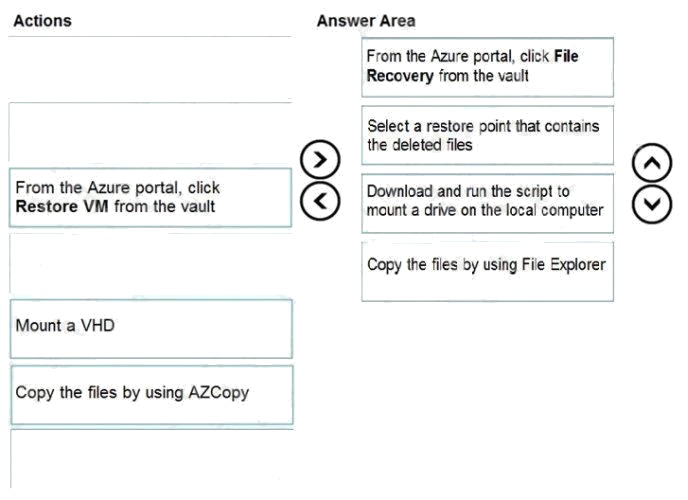
Explanation:
Step 1: From the Azure portal, click File Recovery from the vault
Step 2. Select a restore point that contains the deleted files
Step 3: Download and run the script to mount a drive on the local computer Generate and download script to browse and
recover files:
Step 4: Copy the files using File Explorer!
After the disks are attached, use Windows File Explorer to browse the new volumes and files. The restore files functionality
provides access to all files in a recovery point. Manage the files via File Explorer as you would for normal files.
Step 1-3 below:
To restore files or folders from the recovery point, go to the virtual machine and perform the following steps:
1. Sign in to the Azure portal and in the left pane, select Virtual machines. From the list of virtual machines, select the virtual
machine to open that virtual machine's dashboard.
2. In the virtual machine's menu, select Backup to open the Backup dashboard.
3. In the Backup dashboard menu, select File Recovery.
The File Recovery menu opens.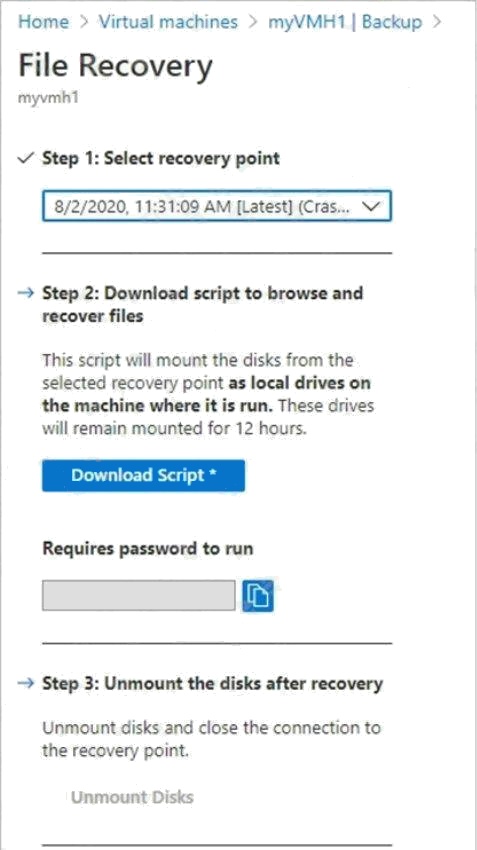
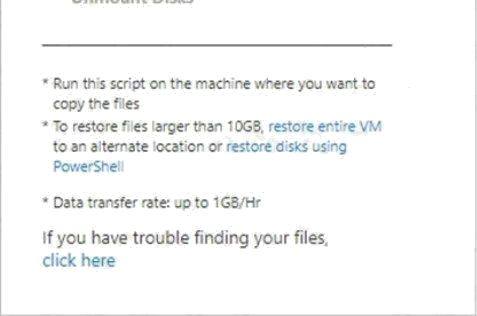
4. From the Select recovery point drop-down menu, select the recovery point that holds the files you want. By default, the
latest recovery point is already selected.
5. Select Download Executable (for Windows Azure VMs) or Download Script (for Linux Azure VMs, a python script is
generated) to download the software used to copy files from the recoverypoint.
Running the script and identifying volumes:
For Linux machines, a python script is generated. Download the script and copy it to the relevant/compatible Linux server.
Reference:
https://docs.microsoft.com/en-us/azure/backup/backup-azure-restore-files-from-vm https://docs.microsoft.com/en-
us/azure/backup/backup-azure-vms-automation#restore-files-from-an-azure-vm-backup
Answer is correct , view the link below
https://learn.microsoft.com/en-us/azure/backup/backup-azure-restore-files-from-vm
You have an existing Azure subscription that contains 10 virtual machines.
You need to monitor the latency between your on-premises network and the virtual machines.
What should you use?
C
Explanation:
Network Performance Monitor is a cloud-based hybrid network monitoring solution that helps you monitor network
performance between various points in your network infrastructure. It also helps you monitor network connectivity to service
and application endpoints and monitor the performance of Azure ExpressRoute.
You can monitor network connectivity across cloud deployments and on-premises locations, multiple data centers, and
branch offices and mission-critical multitier applications or microservices. With Performance Monitor, you can detect network
issues before users complain.
Reference: https://docs.microsoft.com/en-us/azure/azure-monitor/insights/network-performance-monitor
C is correct but please note that network performance monitor is no longer supported by microsoft
Note: This question is part of a series of questions that present the same scenario. Each question in the series contains a
unique solution that might meet the stated goals. Some question sets might have more than one correct solution, while
others might not have a correct solution.
After you answer a question in this section, you will NOT be able to return to it. As a result, these questions will not appear in
the review screen.
You have an Azure subscription that contains the following users in an Azure Active Directory tenant named
contoso.onmicrosoft.com:
User1 creates a new Azure Active Directory tenant named external.contoso.onmicrosoft.com.
You need to create new user accounts in external.contoso.onmicrosoft.com.
Solution: You instruct User1 to create the user accounts.
Does that meet the goal?
A
Explanation:
Only a global administrator can add users to this tenant.
Reference: https://docs.microsoft.com/en-us/azure/devops/organizations/accounts/add-users-to-azure-ad
The user1 which created the tenant is always the tenant owner . Answer is correct
HOTSPOT
You have an Azure subscription that contains an Azure Active Directory (Azure AD) tenant named contoso.com. The tenant
is synced to the on-premises Active Directory domain. The domain contains the users shows in the following table.
You enable self-service password reset (SSPR) for all users and configure SSPR to have the following authentication
methods:
Number of methods required to reset: 2
Methods available to users: Mobile phone, Security questions
Number of questions required to register: 3
Number of questions required to reset: 3
You select the following security questions:
What is your favorite food?
In what city was your first job?
What was the name of your first pet?
For each of the following statements, select Yes if the statement is true. Otherwise, select No.
NOTE: Each correct selection is worth one point.
Hot Area:

Explanation:
Box 1: No
Administrator accounts are special accounts with elevated permissions. To secure them, the following restrictions apply to
changing passwords of administrators:
On-premises enterprise administrators or domain administrators cannot reset their password through Self-service password
reset (SSPR). They can only change their password in their on-premises environment. Thus, we recommend not syncing on-
prem AD admin accounts to Azure AD. An administrator cannot use secret Questions & Answers as a method to reset
password.
Box 2: Yes
Self-service password reset (SSPR) is an Azure Active Directory feature that enables employees to reset their passwords
without needing to contact IT staff. Box 3: Yes
Reference: https://docs.microsoft.com/en-us/azure/active-directory/authentication/howto-sspr-deployment
NO
NO
Yes,
Administrator accounts cant use security questions for verification
https://learn.microsoft.com/en-us/azure/active-directory/authentication/concept-authentication-security-questions
no
no
yes
or
no
yes
yes
i dont know the right answer i ask any one to know
HOTSPOT
You have two Azure App Service app named App1 and App2. Each app has a production deployment slot and a test
deployment slot.
The Backup Configuration settings for the production slots are shown in the following table.
For each of the following statements, select Yes if the statement is true. Otherwise, select No.
NOTE: Each correct selection is worth one point.
Hot Area: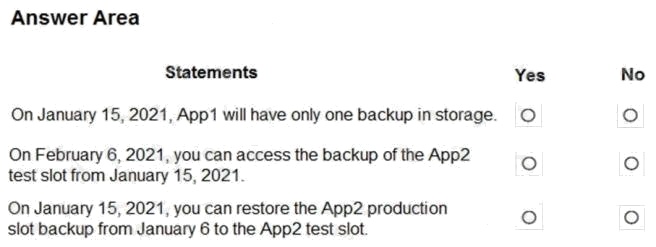
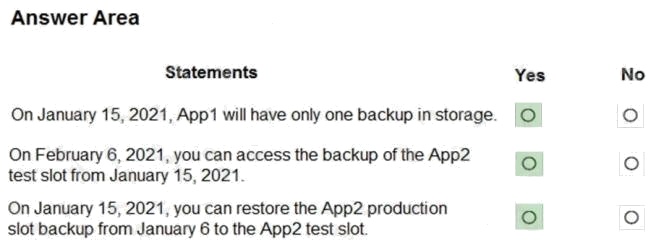
NNY
1. NO - https://docs.microsoft.com/en-us/cli/azure/webapp/config/backup?view=azure-cli-latest
2. NO - only production is mentioned , test slots do not have nay backups
3. Yes - https://learn.microsoft.com/en-us/rest/api/appservice/web-apps/restore-slot
you can restore app2 to another slot
yea its correct
for jan 8 - 5 daily backups including 1 weekly plus 1 monthly - total of 6
for jan 15 - 5 daily backups including 1 weekly plus 1 monthly , 1 yearly and 1 weekly - total of 8 backups
?0000000000
for jan 15 - 5 daily backups including 1 weekly plus 1 monthly , 1 yearly and 1 weekly ----> where did you get the yearly?
são 6 e 8 sdsdsdsdssdsd
6 and 8 is right one
6 and 8 is the correct answer.
click on the link below to know more: https://www.vinsys.com/training/sa/cloud-computing/microsoft-azure-administrator-az-104-certification
january 8-5
january 15th -5